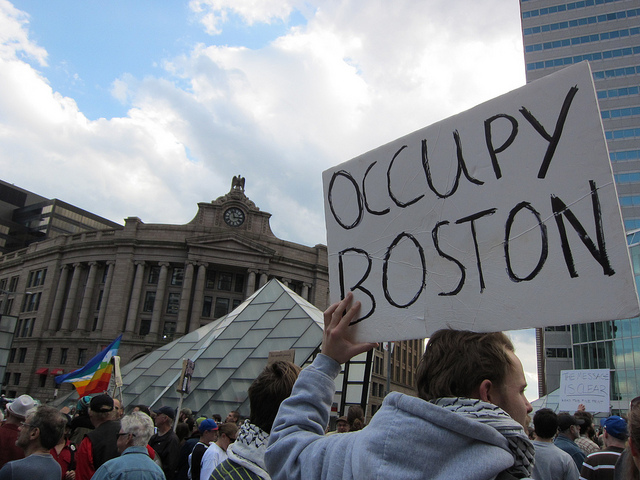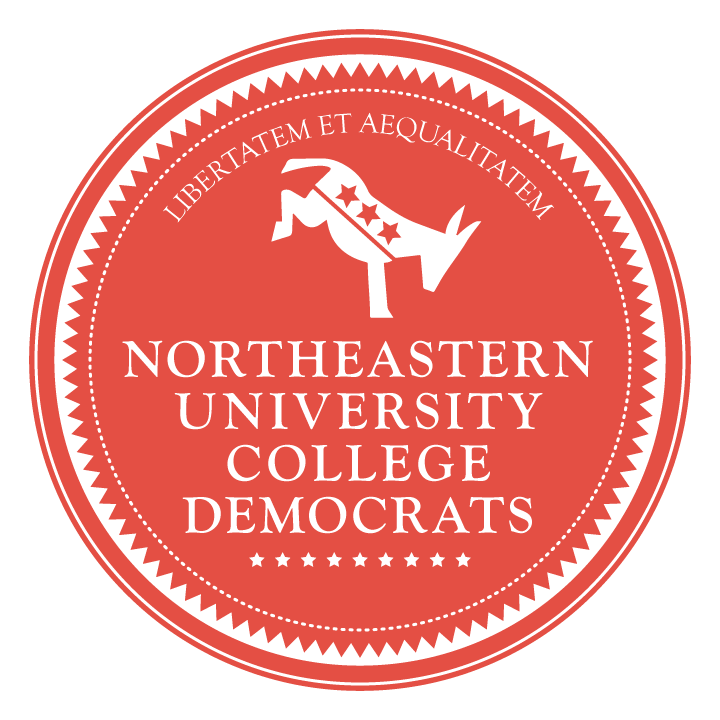
We have all heard about them, the people who call themselves Occupiers. Some paint them as dirty, lazy, hippies who do not want to work. Others view them as average Americans rightfully upset at the state of America and American society. Are they really all homeless hippies? Or are they average Americans representing the 99 percent?
It is 7:30 p.m. on a Friday evening in Boston’s Financial District. Among the high-rise buildings, near the offices of Bank of America, State Street, and Putnam Investments, and directly across from the Federal Reserve building is Dewey Square Park. In this park there are tents packed so tightly together that there is barely room to walk between them. A series of wooden pallets and boards make up streets such as Gandhi Road, which the occupants use to navigate through the tents. Every inch of available space seems to be covered with tents, chairs, wooden boards, people, or dogs. The tents themselves are covered in posters, pictures, and slogans. In the heart of the park there are groups of six to a few dozen people sitting or standing, engaged in discussion, listening to a presentation, or even meditating.
People passing by vary in age from late teens to sixties. There seems to be an even mix of gender and race. Most are not clean-shaven or well dressed, but there is no offensive smell or sight that would drive the average person away. In fact, the atmosphere seems very open and accepting. No one questions another’s presence or makes another feel unwelcome. There are others walking around, checking out the sights, curious about what’s going on. There are volunteers at a food tent serving vegetables and rice, as well as others at the medical tent, equipped with over-the-counter drugs, first aid supplies, and hand sanitizer. It is not immediately obvious, but Occupy Boston is much more organized than it appears.
At the entrance to the park, off of Summer Street, is an information tent. The tent is packed with flyers and handouts covering the table and walls. Kevin, a 26-year-old South Boston resident, has a Masters degree, a full time job in the environmental and sustainability industry, and a part time job he works on Saturdays. Kevin does not sleep at the park, but devotes an average of four hours to the Occupy movement every weekday after work, and eight hours every weekend. He has been an active Occupier for three weeks and plans to stay on indefinitely. He details how the camp is run, stressing that there is no hierarchal structure; decisions are made by consensus in a General Assembly every Tuesday, Thursday, Saturday, and Sunday. Basic needs are met, such as food, clothing, shelter, bedding or tools, with medics and social workers on site 24/7 to mediate any disputes and deal with health issues.
Kevin details the preparations being made for winter. A winter preparation working group meets every day, winterizing tents and seeking assistance from engineers at MIT. Relationships have been formed with churches and shelters in the area in case of emergencies.
Kevin’s family has been generally supportive of his involvement, with some ambivalence. Kevin is not confident that the movement will maintain its positive public perception. He expects coverage will turn negative or dry up, noting that the general strike in Oakland, the first in over 60 years, went relatively ignored by the media. Kevin sees public engagement as key to maintaining positive perception, but notes this will be difficult without media support. While he has not personally experienced any negative reaction from the public, he notes that many Occupiers have faced abuse during marches and protests, and that many politicians and pundits have spewed negative words at the movement. He believes this as a result of a misperception, stating that many seem to think Occupiers are lazy hippies that do not want to work, and just get high and drunk all day. Kevin sees occupying as part of a greater movement that does not have a clear end in sight, and that even when progress is made, “You need to protect the gains that you have.”
While talking with Kevin, several other Occupiers wander in and out of the tent, many of whom are permanent residents at the park. A group of Occupiers can be heard celebrating a companion’s birthday, and it starts to become apparent that the dynamic outside the “info” tent is likely much different than inside it. While Kevin makes it clear there is no hierarchy at the camp, he is certainly more informed and in tune with the logistics of the movement than most, and if knowledge is power, then he holds a good deal of power in the camp, whether he applies it or not.
After walking around the camp for a few minutes, I run into a man named Sean, a permanent resident at the camp. Sean is a 26-year-old from Middleboro who has been occupying for two weeks and plans to stay indefinitely. Sean left school at the end of ninth grade and is a part time construction worker. When asked what living as an Occupier is like he joked that there is plenty of food and funding, but not nearly enough hookers.
Throughout his time occupying Sean has developed a few close friendships and a large number a casual friends. In his down time Sean works out, plays sports, and watches movies. Sean struggled through the storm at the end of October; his tent flooded with about two inches of water and a number of his friends’ tents were blown apart by the winds. He has not kept in touch with his family very much and is not sure how they would feel about him being part of the Occupy movement. When it comes to what outsiders think of the movement, Sean says that he, “don’t give a fuck,” and tends to laugh at instigators.
In the food tent several volunteers stand behind the tables heating and serving food for hungry Occupiers. Nearby, a 23-year-old Occupier named Will is eating a bowl of rice. He is a college dropout from a Boston suburb. He works two or three times a month as an artist. He has been a full time Occupier for about three weeks. He plans to remain “so long as there is free rent and free food.” He compares life at the park to life in any apartment complex, just with ultra thin walls. He and his fellow Occupiers are friendly and sociable with each other, but not incredibly close. In his downtime he likes to hike and smoke marijuana. The Halloween storm posed no problem, as he is used to living in improvised structures, and was prepared with dry rags, supplied by movement organizers. With an excess of heat blankets he also has no worries about the coming winter.
Will’s father assumed he was involved with Occupy Boston before he ever mentioned it. The rest of his family will learn of his involvement at Thanksgiving, and he is curious to hear what his conservative relatives think. Will does not believe it is very likely his issues with the US economic and political system will be settled anytime soon, and notes that prior to residing in a tent as an Occupier he stayed on friends’ couches, following the same ideals.
Wandering to the back portion of the park the pathways disappear and one carefully steps in the open spaces between the tents to meet Donny, 46, who is sitting around a radio with several friends. He is from Lowell, but grew up in Georgia. His last class was in seventh grade and he collects Social Security Disability Insurance. He has been Occupying since day one, September 27. To avoid the harsh winter he is expecting to travel to Phoenix or Los Angeles and join the movement there. He has developed a few close friendships but most are casual. During the Halloween storm he was fortunate to stay at a friend’s house after his tent collapsed under the weight of the rain. His friends and family give him their full support, recognizing themselves among the 99 percent. His perception is that outsiders generally hate Occupiers, perceiving them as “free loving hippies.” Donny’s main gripe is about social security and that the benefits do not often keep pace with inflation and cost of living, but he supports others’ causes as well. He hopes that the movement brings about changes that will enable him to have secure housing.
Not all of the people in the camp are Occupiers. There are three volunteers at the medical tent: two students, who are Emergency Medical Technicians (EMT) basics from Tufts University; and a Navy veteran who goes by the name Medic. Medic was an EMT in Virginia, served two tours in Iraq dealing with heavy trauma, was a damage-control-man for two years in the Navy, and was a lifeguard for five years before that. This is Medic’s second time on the site and his impression is that the majority of the people living at the park are those with nowhere else to go and, “looking for a place to squat, and get fucked up.”
His tasks so far have revolved around dealing with disorderly conduct as a result of drinking and residents with mental health issues. His concern going forward is exposure, which he sees as the real test for the movement. There is an effort to get pallets and concrete blocks to elevate the tents to avoid flooding. While basic supplies come by the plenty, he sees a strong need for an automated external defibrillator and extra blankets. Medic makes sure to emphasize that his interests are the people, not the politics.
If one thing is clear, it is that no general picture can accurately portray those involved in the Occupy Boston movement. My last walk through the camp is somewhat sad, as the picture feels unfinished. Every person has his or her own story, but there are just too many to hear tonight. An elderly man is dressed in a nice suit. One woman is pregnant and hoping to head south for the winter, another is sporting an impressive goatee. There are dozens of people, dozens of viewpoints, and dozens of stories.
The Occupy movement is real and so are its people. They may not all be equally committed, but all participate. They cannot be summed up in a word or a phrase. No single person is representative of the whole. At least in that regard they are truly reflective of the 99 percent of America.


